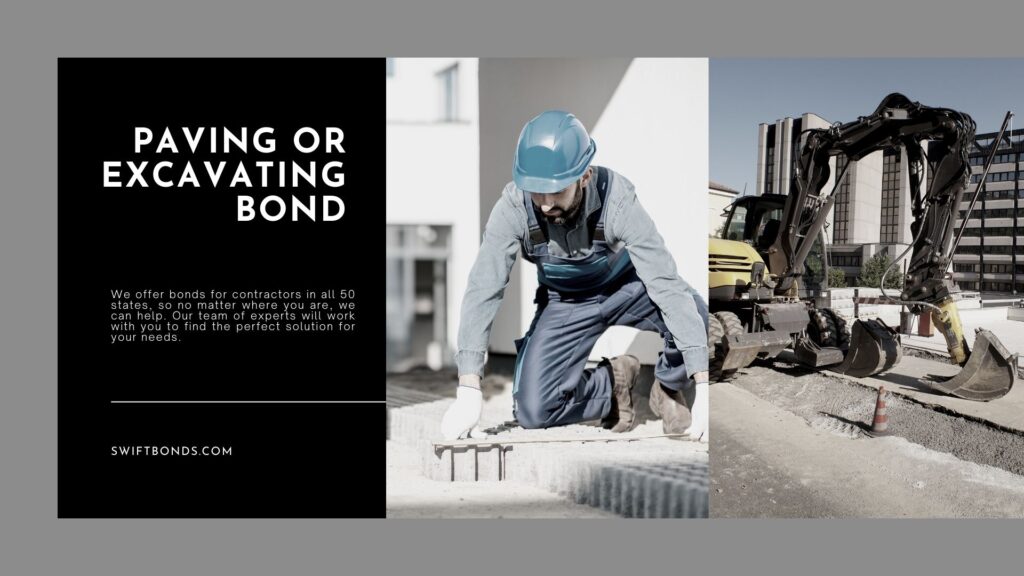
Get An Instant Quote on Homewood, AL-Paving or Excavating Bond ($10,000) Now

Introduction
In the vibrant city of Homewood, AL, paving and excavating contractors play a pivotal role in enhancing infrastructure and facilitating community development. At the core of their operations lies the Paving or Excavating Bond ($10,000), a vital requirement mandated by the city authorities. Understanding the nuances of this bond is essential for contractors seeking to navigate Homewood's regulatory landscape and undertake successful projects. In this article, we delve into the intricacies of the Paving or Excavating Bond, exploring its purpose, requirements, and implications for contractors and the city.

Understanding the Purpose
The Paving or Excavating Bond ($10,000) serves a dual purpose: it protects both the city and consumers. For Homewood, the bond acts as a safeguard against potential financial losses and ensures that contractors maintain high standards of professionalism and safety in their paving or excavating projects. Meanwhile, for consumers, the bond provides recourse in the event of substandard workmanship, property damage, or breaches of contract by contractors. Ultimately, it fosters trust and accountability within Homewood's construction sector.
Requirements and Application Process
Obtaining a Paving or Excavating Bond ($10,000) in Homewood involves meeting specific criteria set forth by the city authorities. Contractors typically undergo a rigorous application process, which may include background checks, proof of licensure, and financial documentation. Additionally, they must secure the bond from a licensed surety company, with the bond amount set at $10,000. By fulfilling these requirements, contractors demonstrate their commitment to operating ethically and responsibly within Homewood.
Implications for Contractors and the City
For paving and excavating contractors, the Paving or Excavating Bond ($10,000) carries significant implications for their business operations. It serves as a prerequisite for obtaining licensure and influences their reputation and credibility within the community. Failure to maintain compliance with the bond requirements can result in penalties, fines, and even suspension of licensure. Conversely, for the city of Homewood, the bond ensures that contractors uphold the city's standards of excellence and contribute to the overall infrastructure development and maintenance.
Conclusion
As paving and excavating contractors embark on projects in Homewood, the Paving or Excavating Bond ($10,000) serves as a symbol of accountability and professionalism. By understanding its purpose, meeting the requisite requirements, and embracing its implications, contractors can forge stronger partnerships with the city and uphold the highest standards of paving and excavating excellence. In doing so, they not only contribute to the growth and prosperity of Homewood but also ensure the safety and functionality of its infrastructure for years to come.
What is the Homewood, AL – Paving or Excavating Bond?
The Paving or Excavating Bond ($10,000) serves as a cornerstone of Homewood's regulatory framework for paving and excavating contractors. But what exactly does this bond entail? Essentially, it is a form of surety bond required by the city to ensure that contractors adhere to all relevant laws, codes, and regulations while conducting paving or excavating work. By obtaining this bond, contractors provide financial security to cover potential liabilities or damages that may arise from their activities.
Frequently Asked Questions
Can the Paving or Excavating Bond ($10,000) Cover Underground Utility Damage Claims?
An uncommon question that may arise among contractors in Homewood regarding the Paving or Excavating Bond ($10,000) concerns its coverage for underground utility damage claims. Contractors may wonder whether the bond extends to cover liabilities or damages resulting from accidental damage to underground utilities, such as gas lines, water pipes, or electrical conduits, during paving or excavating activities. The answer depends on the specific terms outlined in the bond agreement and the regulations set forth by the city. While some bonds may offer broad coverage for various paving or excavating activities, others may require additional endorsements or separate bonds for claims related to underground utility damage. Contractors should consult with their surety bond provider or city officials to clarify the coverage for underground utility damage claims.
Are There Provisions for Environmental Remediation Projects Under the Paving or Excavating Bond ($10,000)?
Another less common inquiry pertains to the provisions for environmental remediation projects under the Paving or Excavating Bond ($10,000) in Homewood. Contractors may inquire whether the bond can provide coverage for liabilities or damages arising from environmental cleanup or mitigation efforts required as a result of paving or excavating activities. This could include soil remediation, erosion control, or habitat restoration projects aimed at minimizing environmental impacts. The applicability of bonds for environmental remediation often depends on the specific terms outlined in the bond agreement and the regulations set by the city. Contractors should consult with city authorities and their surety bond provider to determine the bond's applicability for environmental remediation projects.
Can the Paving or Excavating Bond ($10,000) Extend to Cover Specialized Equipment Damage?
A lesser-known aspect that contractors may inquire about is the extension of coverage under the Paving or Excavating Bond ($10,000) to include damage to specialized equipment used in paving or excavating projects. Contractors may wonder whether the bond can provide coverage for repair or replacement costs of specialized machinery, such as trenchers, excavators, or asphalt pavers, in the event of accidental damage or theft. The applicability of bonds for specialized equipment damage often depends on the specific terms outlined in the bond agreement and the regulations set by the city. Contractors should consult with their surety bond provider or city officials to determine the bond's coverage for specialized equipment damage and ensure compliance with licensing requirements.
